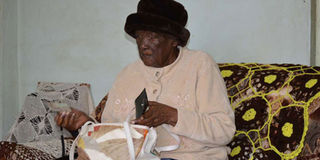Elizabeth Gathoni, widow of Chief Koinange, dies at 117

Elizabeth Gathoni, the widow of colonial-era chief Koinange wa Mbiyu at her home in Kiambaa, Kiambu County earlier this year. PHOTO | ERIC WAINAINA | NATION MEDIA GROUP
What you need to know:
- Mrs Gathoni, born in 1900 according to her national identity card, was the fifth of the chief’s six wives.
Elizabeth Gathoni, who was the only surviving widow of colonial-era Chief Koinange has died at the age of 117 years, which made her among the oldest people world over.
The granny, who was lucky to see her sixth generation, according to her son Leonard Koinange died at her Kiambaa home in Kiambu County on Thursday evening at around 9.30 pm due to what he said was her old age.
“We can say that she has died because to her old age and not illness. She was not sick but had started withdrawing from food, and for the better part of the day, she had refused to take any meal,” Mr Koinange, who is a sixth born said.
STORY
Ms Gathoni, who was born in 1900 according to her national identity card, was the fifth of the chief’s six wives.
Her age, which had saw her participated in all the elections Kenya has ever had, would probably had earned her a slot in the Guinness Book of record saw her story feature in a documentary in the British Broadcasting Corporation (BBC).
The architect of the story is 23-year-old Priscilla Ng’ethe, Ms Gathoni’s great granddaughter who is a London-based freelance journalist with BBC.
After winning a BBC story-telling challenge, the broadcaster assigned her a team to fly with her to Kenya to cover the story.
In April this year when this reporter visited her home after an interview, Ms Gathoni’s character portrayed her as a jovial, full of life, a staunch Christian and a kind hearted person, who loved people, and her story in her own words is that of pain, struggle and resilience.
Despite her age, the memory was fine that she would easily recall the events of her youth, some that happened before Kenya attained independence, and did not have mental faculties which one me have expected her to have due to her age.
According to Mr Koinange, the centenarian was able to identify all of her generations with ease.
Health wise, she was fine, hardly got sick and during our interview, she said he would not have recalled the last time she saw a doctor, yet the vagaries of old age have caught up with some of her children.
Her meals consisted of boiled fresh foodstuffs like potatoes, green bananas, pumpkins, arrowroots, yams and meat.
“I hardly take salt or rice. I can’t recall when I last had them,” said Ms Gathoni who also does not use cooking oil.
Ms Gathoni was born in Muchatha village in Banana, Kiambu County, and never went to school despite her father being wealthy.
Back then, she says, a girl would stay at home until she was of marriageable age.
DISCOS
She remembers going for discos together with her age mates in the hope of getting suitors.
Most of her age mates got married at the age of between 20 and 25 but she delayed following her father’s death and also because she was among the young girls who used to entertain the “who is who” of that time.
“I was a good dancer and a mukui (a troupe leader), and any time there was a show, all the prominent people would refuse to rise until I took to the floor. This took much of my time,” Ms Gathoni said.
Her journey to marriage is an interesting one. Mr Koinange would visit their home to see her brother who had taken over their father’s role after his death.
Ms Gathoni, who reckoned she was a beautiful girl, had an elder sister who was yet to be married.
And according to Kikuyu customs, a woman would not be married off until all her elder sisters have found husbands.
For some reason, Ms Gathoni and her family were convinced that the chief had an interest in her elder sister.
In fact, she often tease her elder sister, telling her she would get married to an “old man”.
The bald-headed chief was almost the same age as their father.
One day, young men drove a herd of goats to Ms Gathoni’s home, and this was a sign that the chief had chosen a woman in the homestead to be his wife.
The following day, a marriage ceremony was to take place.
But on that night, Ms Gathoni’s elder sister escaped.
This meant that the ceremony had to be cancelled and that the chief would have to collect his goats.
But he said he would not collect them; that his interest was in Gathoni despite the fact that she had never spoken to him, leave alone receiving a marriage proposal.
“I had no choice but to get married. I think then we were very foolish because after few days, without a second thought, I was escorted out of my home,” she recalled.
She got married in the Christmas season when most colonial chiefs married for the first time or acquired additional wives.
After the quick turn of events, Ms Gathoni settled into her duties as a wife. She bore seven children. The eldest, a daughter, was born in 1932.
She would latter suffer during the fight for independence after her husband was labelled a rebel who was sympathetic to Mau Mau despite having been given a job by the British after he sided with the armed resistance group.





